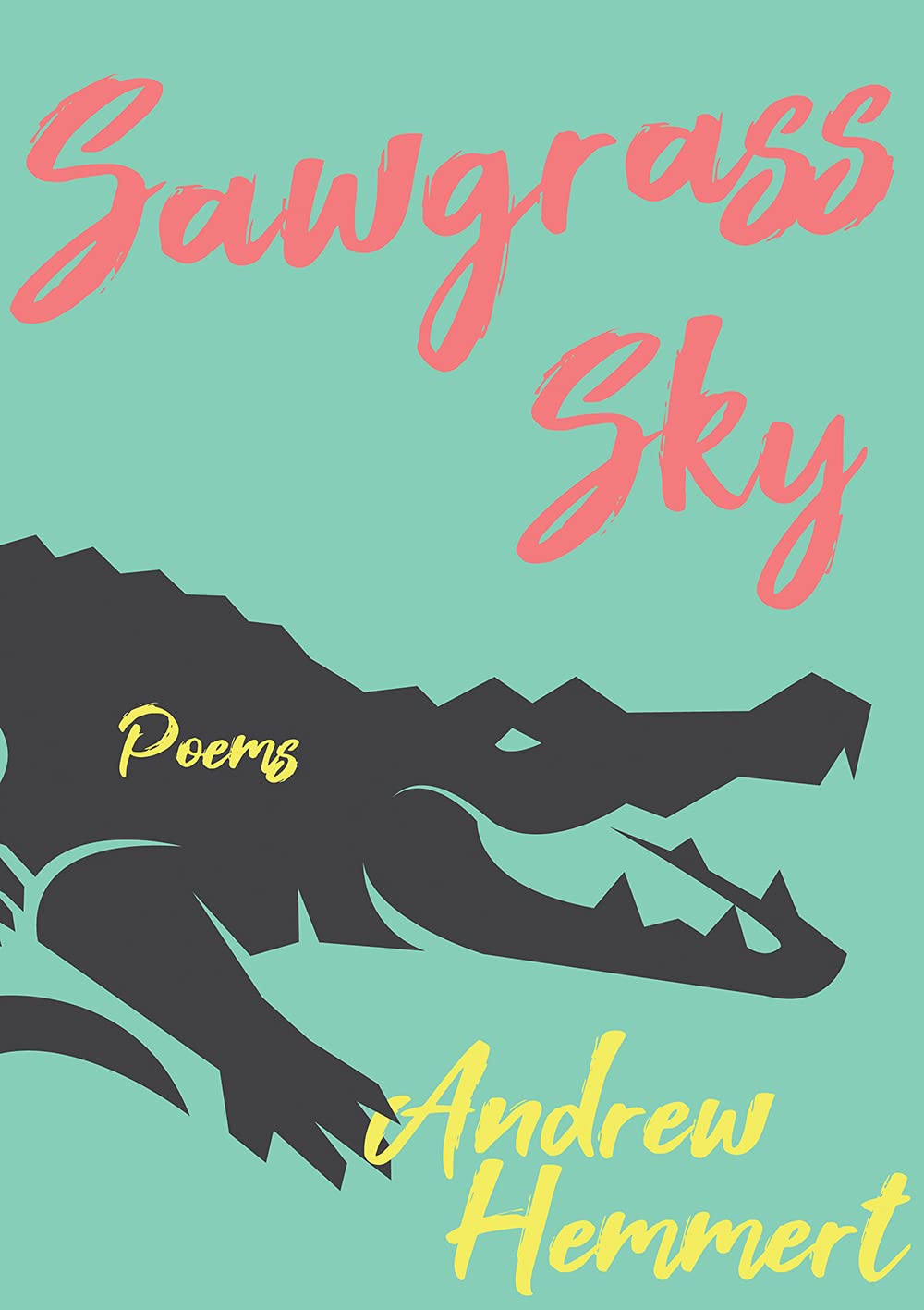|
Vertical Divider
All told, Sawgrass Sky took me four years to write. This includes the three years I wandered from subject to subject in grad school at Southern Illinois University Carbondale. At the encouragement of Judy Jordan, my thesis director, I was writing poems about my past, my family, and the diminishing, distant landscape of my home state of Florida. Eventually the disparate narrative fragments coalesced into a portrait of my life prior to that point.
The book did not begin to feel complete until I started incorporating poems that looked simultaneously towards the past and the future. “Sawgrass Sky” and “Runaway” are examples of such poems. When I read collections of poetry, especially those that lay claim to the form of memoir-in-verse, I look for the poems that begin to forge a way forward. What this means is that the book’s poems should not merely inhabit a broken line with a beginning and an end. The book’s poems should continue into the thematic horizon, suggesting a way to live that transcends the collection’s inherent traumas and obsessions. I could only conceive of my book as complete once such poems appeared within its pages. And because the book was comprised of content drawn from my life up to the point of the poems’ conception, to write these poems required an honest self-examination of what I hoped my future would resemble. Better put, to write these poems entailed pursuing such a future. The book’s title occurred to me long before the book existed in any meaningful sense. Florida’s official state anthem is “Where the sawgrass meets the sky.” I had a vision of the Everglades—how endless the swamps can feel when you’re in them, as far-reaching as the sky itself. “Sawgrass Sky” was Florida, a place once caught between infinite sawgrass and infinite sky. At the time, I believed I had to write a poem titled “Sawgrass Sky” to justify it as a title for the book. While I now see that it’s far from true that a phrase need appear within a collection to qualify as a title-phrase, I’m glad that erroneous notion brought me the title poem. It’s one of my favorites in the collection. “Sawgrass Sky” is the book’s title poem in two senses. In addition to literally giving the collection its title, it also addresses themes and narrative ideas that the book needed for closure. I wrote it in Florida, the summer after I graduated. I wanted to focus on my fixation on place as a subject in the time of catastrophic climate change. I also wanted to weave together some stories that I’d previously been unable to make into standalone poems for the book. Seeing a car on fire at the intersection of I-75 and I-4—and feeling at a crossroads myself—opened an avenue for the book’s conclusion. Part of me believes “Sawgrass Sky” is the most fully realized poem in the book. Realistically, it’s just the newest, and I’m always inclined to believe my newest work is my best. But I love the way the poem operates and leaps. When I read it now, it feels boisterous and joyful and messy and sad. It feels like a definite, if complicated, ending for the book. |
Manuscript Making: On Crafting Collections |
Sawgrass SkyFlorida I’ve given you too little. Last night you were burning
in the rain—a silver commuter car, the fire reaching from under the hood and spreading through the paint-sloughing body of the automobile, that awful salt-gray smoke in the dark like a hot air balloon made of dust, rising but still staked to the earth. I saw the car and kept on through the night. You’ve been burning all year, sapped by a drought that shriveled lawns to cigarette paper and sharpened each lightning strike into a wildfire waiting to happen. You’ve been burning all year, barely any rain since January, and yet as soon as my car crossed over the Georgia border your blue skies fumed with storm clouds. Home again, and you wouldn’t be home without afternoons of thunder crack, the ground shaking like the bolt was a harpoon taking hold in the dirt and yanking us all heavenward. Florida, not being here is easier than pitting my parents’ God against my godlessness—the church bell still ringing me awake—or talking to my brother and reminding myself how little I know about what it means to be anybody’s brother. Down the road there’s a place I used to drink that, after I left home, my brother adopted. It’s dark and small, with room only for a dozen or so patrons, and smells like metal and oysters. We went there together once, told the bartender we were brothers, and she squinted at our faces like fine-print maps, said she didn’t see it-- whatever she was looking for, whatever landmark would let her believe it. Sometimes I can’t see it myself. And acting like it is another thing entirely. I remember racing another driver through Lakeland on I-4 while my brother slept in the passenger seat. I pushed my mother’s car to the limit of what caution its speedometer could offer, the steering wheel shuddering in my hands, and I didn’t let off the gas until the other driver gave up and fell back, my legs shaking as I brought the car down to ninety. I could have lost my license. I could have killed us both. I want to say it was redemption when my brother dropped a shot glass in the kitchen years later, stepped down hard and drove an overlooked shard deep into his heel. He limped into my room, shotgunned a beer, and I unsheathed the piece from his foot. No redemption, just blood, just another reason to wash my hands. Florida I’m gone and going farther, Illinois already in the rearview mirror and Michigan on the horizon—lake-effect snow, sidewalks strewn with salt and factories abandoned, and in the absence of industry washed over by the ever-thriving industry of rust. There’s something about a landscape eating itself that reminds me of you. In not too many years, the city where I was born will be underwater, and the city where my mother was born, and all her father’s family. All our generations drowning in their graves, water entering the sand-laced dirt and rolling what’s left of their coffins, rolling them over like anachronistic turbines under the grass—as if the only thing after death was an idiom for regret. Florida I’ve made you into a graveyard again and it’s not fair. You’re a sawgrass sky, you’re swarms of monarchs like ripe orange groves in migration. You’re more than the violence we heap on your head like phosphogypsum stacks, more than mugshots and rubberneckers and the bitter mist that crop dusters drag behind them like intangible advertisements. You’re more than one man’s regrets. You’re more than the house I grew up in, which isn’t mine anymore. I’ve been turning it over, the moment when my mother walked in from the backyard and handed me a garbage bag full of dove nests she’d swept from the rain gutters. Even then, walking those nests to the curb, I felt like I was throwing away everything I’d ever known, all of it bagged and bound for some landfill I might know only as an acrid note as I passed by on the interstate, or see, rising like a massive grass-crowned tomb. Down here our mountains are made of what we no longer need, or have chosen to abandon. Some birds collect bright threads and weave them into the dry grass of their nests, so anyone plucking a loose thread from their shirt could be, without knowing, donating the weight on their shoulders to the intricate knot in which two birds perpetuate the idea of flight. My threads were in those nests. Florida I’ve flown, too far and not far enough, on wings of wanderlust and gasoline, and the reconciliation of any home to the idea of home is like a car fire in the rain, seen at night, just a glimpse, so the car might as well be burning still—the rain spitting in the fire’s face, the fire burning regardless, and the occupants nowhere to be seen. I imagine they ran from the blaze, knowing the car could explode. Then, even when they arrived at a safe distance, I think they kept going. Hiked the highway’s shoulder, storm water heavy in their hair, in their clothes, in the thick night air, turning around every now and again to see how small they could make the fire just by walking away. |
RunawayRead in Poetry Northwest.
Vertical Divider
|
ANDREW HEMMERT is the author of Blessing the Exoskeleton (forthcoming, Pitt Poetry Series) and Sawgrass Sky (Texas Review Press). His poems have appeared or are forthcoming in various magazines including the Cincinnati Review, the Kenyon Review, Michigan Quarterly Review, Prairie Schooner, and the Southern Review. He won the 2018 River Styx International Poetry Contest. He earned his MFA from Southern Illinois University Carbondale, and currently serves as a poetry editor for Driftwood Press.


